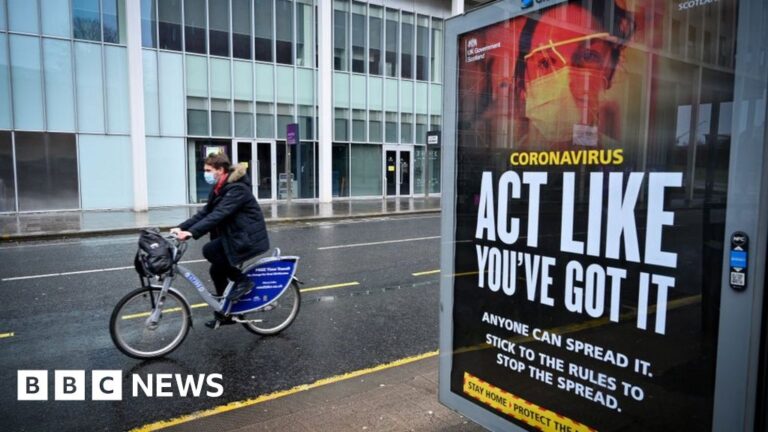The Scottish government needs to be clearer about how and why it spent £12bn of emergency funding during the Covid pandemic, the country’s spending watchdog has said.
Audit Scotland said more than 300 funding announcements have been made at Holyrood in response to Covid.
But it said it was hard to see how some financial decisions were reached.
And it said the government needed to allow greater scrutiny of whether its spending achieved the desired results.
Audit Scotland’s report said the Scottish government had worked well with the UK government, councils, NHS boards and other public bodies to direct billions of pounds of Covid funding in difficult circumstances.
- Watchdog concern over where £5bn Covid funds went
However, it said the authorities were not prepared for the scale or speed of the response required and lessons need to be learned ahead of any similar disruptions in the future.
The report said that:
- Spending decisions were recorded differently across government departments, and it was not always clear how data was used to inform funding allocations.
- Decisions were not centrally collated, making it hard to see how some financial decisions were reached.
- So far, there had been limited evaluation of the difference the financial response to the pandemic had made to people’s lives.
Audit Scotland found that the Scottish government had managed its budget effectively over the past two years, but some Covid funding remained unspent.
Some £15.5bn was allocated for Scotland’s Covid response between 2020-2022, of which an estimated £11.8bn spent between March 2020 and December 2021.
It said £2bn had been added to reserves by the government, councils and other public bodies at the end of 2020/21, but it was not possible to say how much of that was from Covid funding.
Stephen Boyle, the auditor general, said it was vital for transparency and financial planning that the government is clear about how one-off Covid funding is being spent, including money in reserves.
He added:
“More work is also needed by the Scottish government to collect the data that will allow it to understand the difference its interventions have made and plan the country’s recovery from Covid.”
Finance Secretary Kate Forbes said the pandemic had created challenges on a scale the country’s people and economy had not faced in decades.
Ms Forbes said: “At every stage, the Scottish government worked to safeguard lives, businesses, jobs and livelihoods, acting as quickly and efficiently as possible to support people and businesses.
“Despite the impacts of the pandemic, many of which are still being acutely felt, we worked collaboratively with all sectors of the economy to identify those most in need and then with local authorities and partners to utilise existing systems to ensure financial support was delivered swiftly and effectively.”
‘Secrecy and mismanagement’
Scottish Labour’s Covid recovery spokeswoman Jackie Baillie said the public “deserves to know exactly what happened” to unspent money that was set aside for the pandemic response.
She said: “This report lays bare the secrecy and mismanagement at the heart of this SNP government.
“Getting this lifeline funding to all those who needed it was a matter of urgency, but that shouldn’t have come at the expense of transparency.”
Her Scottish Conservative counterpart, Murdo Fraser, said Audit Scotland had shown that the Scottish government had spent £2bn less than they were given by the UK government by the end of last year.
He said: “A gap between nationalist rhetoric and delivery is typical
– but the watchdog’s alarming conclusion is that we simply don’t know how, where, or even whether, these funds were spent. That’s simply unacceptable.”
The Federation of Small Businesses suggested that any leftover Covid funding could be reallocated to firms struggling with overheads during the energy crisis.
A separate Audit Scotland report published in March said it was not possible to say exactly where almost £5bn of business support business funding had gone during the pandemic, or how quickly it had been received, due to gaps in the Scottish government data.

